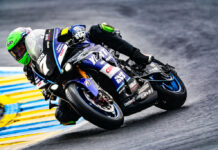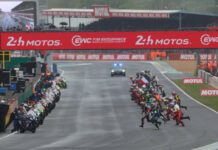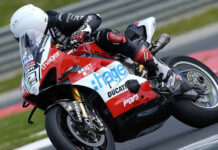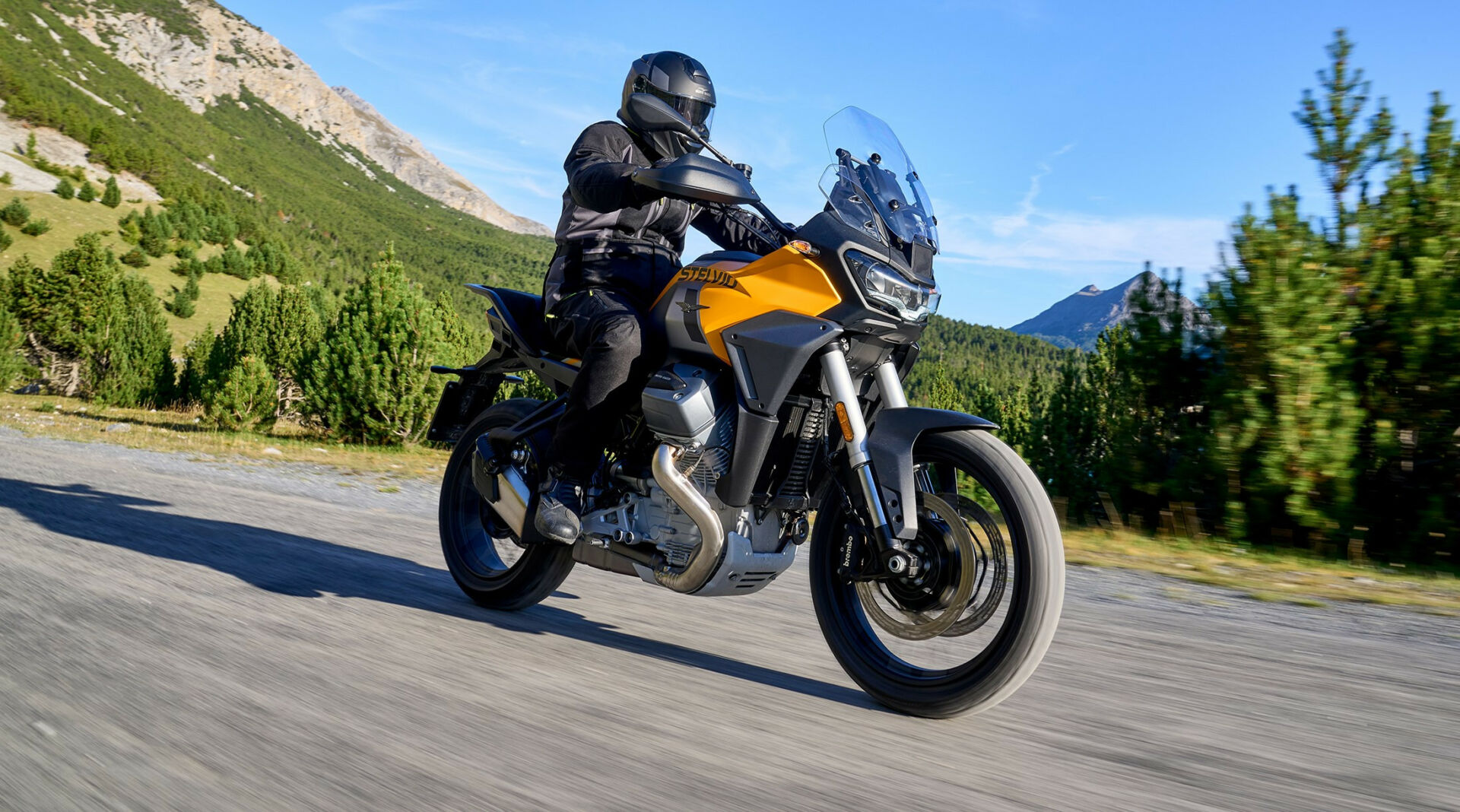MOTO GUZZI STELVIO – NEVERENDING JOURNEY
REVIVING A LEGENDARY NAME SYNONYMOUS WITH ADVENTURE TOURING: MOTO GUZZI PROUDLY UNVEILS STELVIO – THE NEVERENDING JOURNEY
STELVIO, WITH ITS BOLD PERSONALITY, REDEFINES THE ON-OFF ROAD EXPERIENCE. IT’S BUILT ON MOTO GUZZI’S MOST ADVANCED TECHNICAL FOUNDATION, BOASTING A COMPACT TWIN-CYLINDER ENGINE THAT LEADS THE PACK IN PERFORMANCE. ITS INNOVATIVE TECHNOLOGIES ARE DESIGNED TO ENHANCE BOTH THE JOY OF RIDING AND SAFETY.
MAKING A MAIDEN APPEARANCE ON THE STELVIO IS THE “PFF RIDER ASSISTANCE SOLUTION” DEVELOPED IN BOSTON BY PIAGGIO FAST FORWARD, WHICH, THANKS TO RADAR ROBOTICS-DERIVED TECHNOLOGY, ENSURES SAFER RIDING IN ANY SITUATION
As Moto Guzzi launches into its second century, it remains committed to crafting motorcycles that exude authenticity and exclusivity. After celebrating the milestone of its 100th anniversary in 2021, Moto Guzzi unveiled the V100 Mandello in 2022, an innovative motorcycle conceived and designed completely from scratch, an epoch-making technical breakthrough. A motorcycle full of brand-new technologies, powered by the new liquid-cooled 90° transverse V-twin engine.
On such a modern technical basis, Moto Guzzi now introduces the Stelvio, the second chapter of an initial masterpiece. Stelvio is a name of immense renown, held in high regard and cherished by motorcyclists. Moto Guzzi has made a conscious choice not to attach it to any other acronym, acknowledging the profound respect it commands within the motorcycling community. This is the precise moniker that it bears: Moto Guzzi Stelvio, named after the famous Alpine pass, that connects two valleys through 48 legendary hairpin bends, an essential destination for any motorcyclist. Hence, Moto Guzzi Stelvio stands as the ultimate destination for the seasoned motorcyclist, offering an opportunity to ascend to the peak of riding pleasure while seated in its saddle.
Moto Guzzi Stelvio is a state-of-the-art motorcycle that reaches towards the future. What remains unaltered is Moto Guzzi’s unique design and construction philosophy, distinctive technical preferences and a contemporary style that embraces the future while maintaining the unmistakable essence of Moto Guzzi. A guiding philosophy underpins an on-off road motorcycle meticulously crafted for endless journeys, exuding allure, and delivering an exquisite riding experience. It is driven by an engine with peerless performance attributes and a distinctive sound.
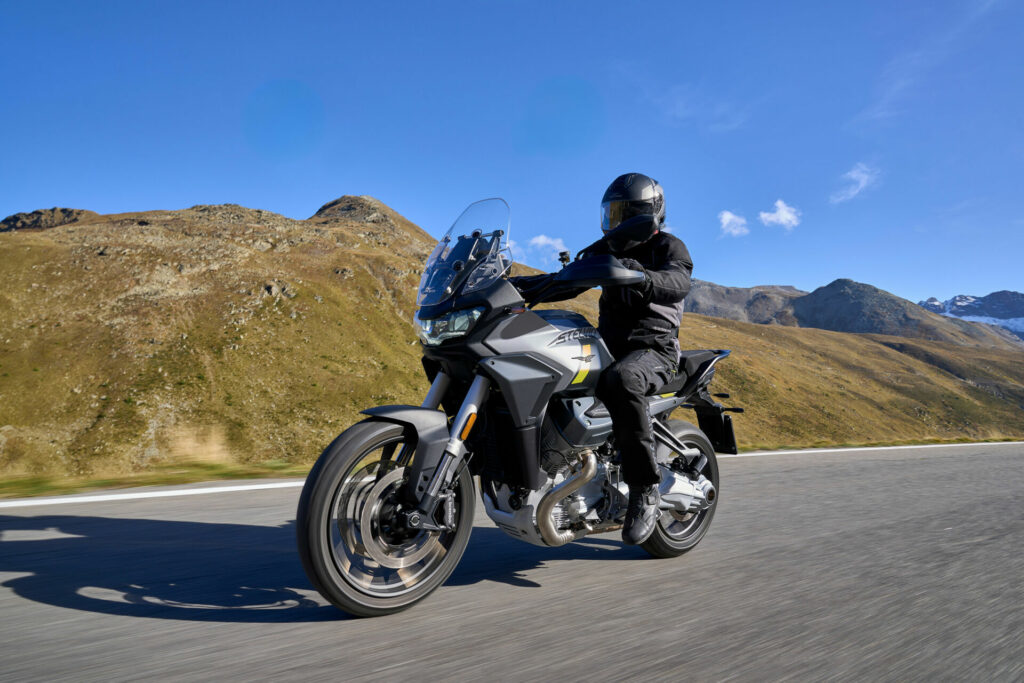
Unmistakable Design and Advanced Aerodynamics
Fascinating, sophisticated, and original: the Moto Guzzi Stelvio is the only motorcycle in its displacement class with a truly innovative development Cardan shaft drive and the only one with an electrically height-adjustable windshield. More importantly, it is the only one to boast such engine architecture of this type. While there are numerous captivating twin-cylinder engines, only one boasts a 90° transverse V-twin configuration and that’s the hallmark of Moto Guzzi. It possesses an utterly distinctive and unparalleled character in the way it delivers torque. The V twin is not only the beating heart of the Stelvio, but also the epicenter of its design, just as it is on every other current Moto Guzzi. The entire design commences with the elevation of the sculptured engine, where the cylinders appear to burst out of the tank and progress in a very contemporary style. The geometric dissection of the primary bodywork components, centered between the tank and seat, amplifies the elegance of its lines, all whilst maintaining an exceptional focus on intricate details. Materials, colors, and finishes are oriented toward future style trends, simultaneously accentuating the Italian essence of the motorcycle through its forms and intricate details. The feeling of dynamism is emphasized by the slender tail and larger shapes that dominate the front, a choice in which design meets the needs for protection and comfort necessary in a travel and touring-orientated bike.
Aerodynamics have undergone an extensive and meticulous overhaul, spearheaded by a dedicated team of engineers solely focused on this aspect. The aim was to optimize air protection, comfort, and the joy of riding, aligning with Moto Guzzi’s legacy as the first pioneering motorcycle brand to possess its very own wind tunnel. It took more than 1,500 hours of simulations with CFD (Computational Fluid Dynamics) calculation software and countless sessions in the wind tunnel to determine the ideal surfaces that would offer maximum protection for the rider and passenger, while occupying the least space. The windshield was also the subject of special study and is shaped to deflect flows while avoiding rear air vortices, aided by the presence of the two side deflectors. To accommodate different statures, it is electrically adjustable in height up to 150 km/h, with a range of as much as 70 mm. Moto Guzzi Stelvio also evokes iconic models from its rich heritage, drawing inspiration from elements such as the louvers present in the under-seat sides, yet embracing modernity and innovation in their redesigned form. This is the perfect motorcycle for those who take pleasure in observing details while running their hands along its surfaces, capable of evoking thrills well before the journey even begins. Whichever way you look at it, it is unmistakably a Moto Guzzi: the identity is confirmed frontally by the LED lighting system, with DRLs stressing the outline of the eagle, and laterally too, by the unique architecture of its completely exposed engine. Meticulous attention to detail extends to this aspect: the radiator’s inconspicuous placement and the concealment of rubber connection hoses from view, alongside the thorough refinement of the electrical system, where the wiring remains completely hidden, all contribute to the enhancement of the mechanical purity.
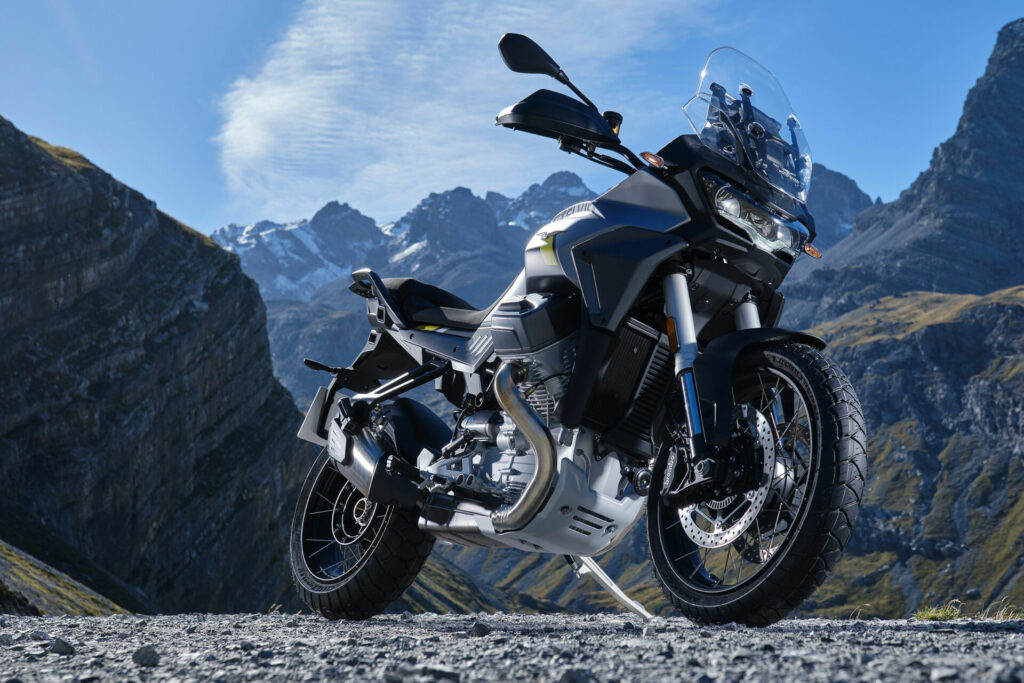
Revolutionary Twin-Cylinder ‘Compact Block’ Engine Further Refined
Moto Guzzi Stelvio is powered by the engine unit recently introduced on the V100 Mandello, though it distinguishes itself in several respects, elevating the overall satisfaction of the riding experience. It should not be a big surprise that two motorcycles of such different backgrounds share a common engine. The Moto Guzzi V100 Mandello and Stelvio projects started in parallel before following quite different development paths. The Moto Guzzi engine builders received a clear directive right from the start: to craft an engine suitable for a variety of motorcycle types. For instance, the decision to create an oil sump isolated from the crankcase via a reed valve has resulted in minimal expansion of the lower portion of the engine. This design choice enhances the essential ground clearance required for overcoming off-road challenges.
Moto Guzzi’s ‘compact block’ is a state-of-the-art engine in terms of design and construction; compact and lightweight, it affords an agile chassis imbued with a spirited character. This potent and responsive engine is perfectly equipped to accompany Moto Guzzi over the forthcoming decades, in line with the needs of modern motorcyclists who seek the thrills of the torque with every twist of the throttle, all while balancing fuel efficiency and moderate running costs.
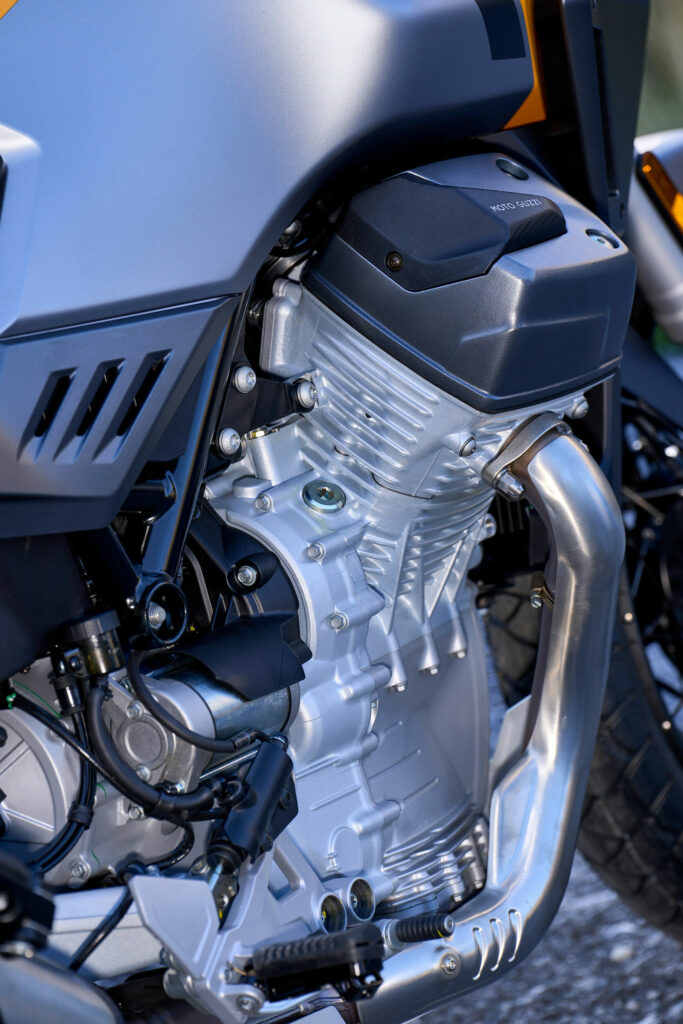
The engine is a 90° transverse V-twin with liquid cooling and dual overhead camshaft timing with finger rockers and 4 valves per cylinder. The effective displacement is 1042 cc, while the bore to stroke values are 96 X 72 mm. As mentioned, the crankcase takes advantage of wet sump lubrication, with the crank chamber separated from the oil sump by a reed valve pack. This system allows for a lower engine due to a shallower oil pan, saving space and lowering the volumes which benefits the handling and – in the case of the Stelvio – leaves ample ground clearance for avoiding off-road obstacles. In addition, by decreasing the lubricant in the crank chamber, it has the advantage of decreasing friction and thus fuel consumption, as well as contributing to size containment. In general, a huge effort has been made to decrease inertia as much as possible (up to 50% less than the previous 1200 8V engine), decreasing weight and giving better responsiveness. A counter-rotating shaft is integrated, designed not to balance the primary forces, as they are inherently balanced by the 90° architecture. Instead, its purpose is to reduce reverse torque, thus enhancing rideability and eliminating any undesirable reactions during both acceleration and deceleration; The inclusion of this component has also enabled a reduction in the weight and dimensions of the crankshaft, thereby enhancing both compactness and overall performance. The outer crankcases were designed to have the structural function of reinforcing the frame, with its eight attachment points. The rider foot-pegs are securely fastened to the crankcases with just a few rubber pads, taking advantage of the engine’s superb balance to effectively eliminate vibration.
The ground-up design has yielded an exceptionally compact power unit, measuring 103 mm shorter than the smaller block of the V85 TT, and weighing less than the 1200 8V, the last four-valve engine manufactured by Moto Guzzi. A significant contribution comes from the hydraulically controlled wet multi-plate clutch with a slipper system. This system is not only more robust and dependable but also more compact and lighter compared to the dry single-plate solution used in other models currently in production. The alternator has been repositioned for improved efficiency, no longer residing at the front but now nestled within the V of the cylinders.
Another distinguishing feature from recent engines produced in Mandello del Lario is the 90-degree rotation of the cylinder heads. This decision not only creates more generous legroom but also streamlines the arrangement of the intake line and electronic injection components. Indeed, the two throttle bodies feature shorter and straighter high-turbulence ducts, which effectively enhance the delivery of the air/fuel mixture to the combustion chambers. This results in clear advantages such as increased power, smoother delivery, improved fuel efficiency, and reduced emissions of harmful pollutants. The decision to employ double overhead camshaft timing with finger rocker arms has enabled the implementation of more assertive valve lift profiles, leading to improved performance. Simultaneously, this design enhances combustion efficiency by eliminating fuel wastage. Contributing to this is the Ride-by-wire electronic control system, guaranteeing precise throttle control without any abrupt on-off response during throttle operation. The rotation of the cylinder heads facilitated the creation of an exhaust system featuring two smoothly curving headers that merge into a dual-exit tailpipe. Additionally, the headers are equipped with protective shields designed to divert hot air flows away from the rider’s legs.
The six-speed gearbox has undergone a redesign, resulting in even smoother and more seamless gear shifts. This was achieved by relocating the cotter from the primary shaft of the gearbox to the clutch, thereby enhancing its damping capacity and overall operation. With the same objective, the cam gear shift was altered to include optimized swingarm pilot cams. Furthermore, the performance of the quick shift (available as an accessory) has been improved thanks to new electronic operating strategies.
This power unit undoubtedly delivers a sporty level of performance: maximum power is 115 hp at 8,700 rpm while maximum torque is 105 Nm at 6,750 rpm, with 82 percent available as early as 3,500 rpm and the limiter set at an impressive 9,500 rpm. These statistics aptly illustrate the engine’s character and robustness, providing substantial low-end torque for a riding experience that truly embodies the Moto Guzzi legacy. However, the modern design has also resulted in an engine with low fuel consumption (5.1 l/100 km) and favorable running costs, with a service interval scheduled every 12,000 km.
Moto Guzzi Stelvio complies with the Euro 5+ emissions standard, partly due to the introduction of three lambda probes.
The final drive shaft drive makes use of an aluminum single-sided arm positioned on the left side. Compared to the one on the V100 Mandello, it has been reinforced to adapt it to off-road use. The minimal output of the drive shaft and the extensive longitudinal extension of the swingarm have effectively eradicated the initial upward effect upon opening the throttle, eliminating the necessity for reaction rods on the swingarm. This results in a seamlessly smooth riding experience during both acceleration and deceleration, akin to a chain drive, while still enjoying all the benefits of a cardan drive, including reduced maintenance and easier cleaning. One of the distinctive aspects of this system is the inclusion of a solitary universal joint located at the swingarm fulcrum, tilted at a 6-degree angle. This design choice not only maintains a slender central profile for the bike, reducing weight and enhancing ergonomics, but it also features a bevel gear set at an 84° angle (in contrast to the 90° angle found on other Moto Guzzi models). This arrangement allows the swingarm to accommodate a 170/60 tire fitted on a 4.5-inch tubeless spoke rim, emphasizing the adventurous spirit of the Moto Guzzi Stelvio.
Peak Riding Pleasure
It’s designed to excel in all usage scenarios, delivering comfort and unwavering performance in adventure touring, everyday convenience, and providing an exhilarating experience for those who seek sporty road riding. This is what we call versatility and Moto Guzzi Stelvio exemplifies the art of blending multiple personalities into a single motorcycle. The common denominator is the joy of riding and the feeling with the front wheel, capable of providing an unparalleled experience. This is the outcome of a design philosophy rooted in the craftsmanship of the master fabricators from Mandello, renowned worldwide. The credit for such a delightful and satisfying ride belong to the optimal weight distribution and the lowering of masses, allowed by the engine architecture and the 21-litre fuel tank that extends beneath the seat. But also, to the special layout of the new steel tube frame dedicated to Moto Guzzi Stelvio that uses the engine as a load-bearing element. Compared to the unit that powers the V100 Mandello, the front-end has undergone a complete redesign making it stronger and better suited for adventure riding. Furthermore, it now features different dimensions. The frame also boasts four front anchor points instead of the two on V100 Mandello, giving a 20-percent increase om rigidity. The 1520 mm wheelbase and 25.6° steering head angle give agility and sporty flair on curve-filled road.
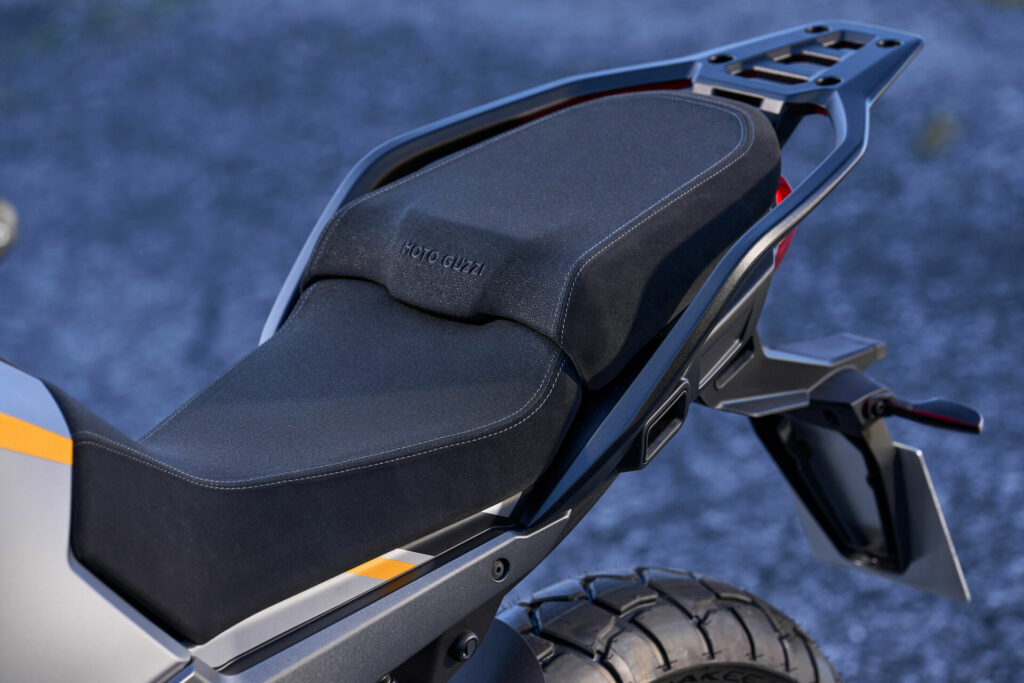
The touring attitude is guaranteed by the ample comfort of the generously sized seat, positioned at just 830 mm above the ground and the active riding position that keeps the back upright and the legs slightly bent. It is easy to manage from a standstill and offers solid balance when both feet are on the ground, thanks to its narrow central section. In keeping with Moto Guzzi’s longstanding tradition of on-off road motorcycles, the new Stelvio also features wide, adjustable-section aluminum handlebars, perfect for off-road control while also providing a more relaxed touring posture. The passenger is an integral part of the design and can count on a wide, well-padded portion of the seat with large grab bars and a posture that allows comfortable movement. The luggage retention system is highly ingenious (available with a rich catalogue of specialized accessories), without requiring any additional supports, thus leaving the look of the bike uncluttered when not in use, saving weight and minimizing lateral bulk. Attaching them is a breeze – just raise the passenger seat and insert the case hooks into the designated slots.
The suspension system is exclusively tailored for Stelvio, delivering both control and excitement in sporty riding, as well as the necessary comfort during long journeys and reliable grip on less conventional terrain, courtesy of its ample 170-mm travel. The Sachs fork, equipped with 46 mm stanchions, is adjustable for rebound hydraulics and spring preload, while the KYB shock absorber allows adjustments for rebound hydraulics and spring preload via convenient manual controls. Its sloping configuration is meticulously designed and fine-tuned to provide a progressive response and sensitivity in cushioning bumps in the road. The Brembo braking system incorporates a pair of 320-mm floating steel discs at the front, engaged by radial-mount monobloc calipers. The handlebar master cylinder, along with the clutch master cylinder, is also of a radial design, and both feature adjustable levers for distance to the handlebar. For the rear brake, a 280-mm disc is engaged by a dual-piston caliper. Tubeless spoked wheels, with a 19-inch front and 17-inch rear, accommodate tires designed with a structure and tread pattern suitable for light off-road riding.
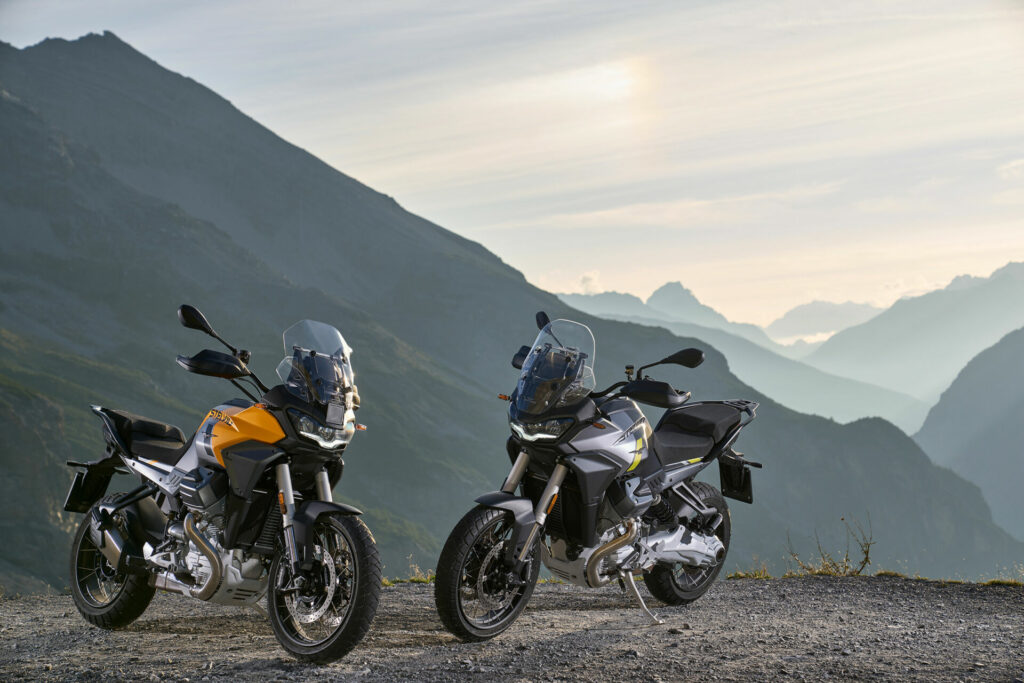
First With Radar Sensors for Safer Riding
Stelvio is the first Moto Guzzi equipped with the PFF Rider Assistance Solution, offered as a factory option (the bike can be ordered with or without).
This cutting-edge driving assistance platform is built on 4D Imaging Radar technology and was developed by Piaggio Fast Forward, a robotics expert based in Boston, founded in 2015 by the Piaggio Group.
This is the first time that such radar sensors (one is located above the front headlight assembly and one below the rear headlight assembly) have been implemented for use on a motorcycle, which has very different dynamics compared to a car, with significant variables of the lean angle when cornering. The advantages, compared with a traditional ultrasonic sensor-based driver assistance system, lie in an extremely wide field of vision and reliable monitoring regardless of lighting and environmental conditions.
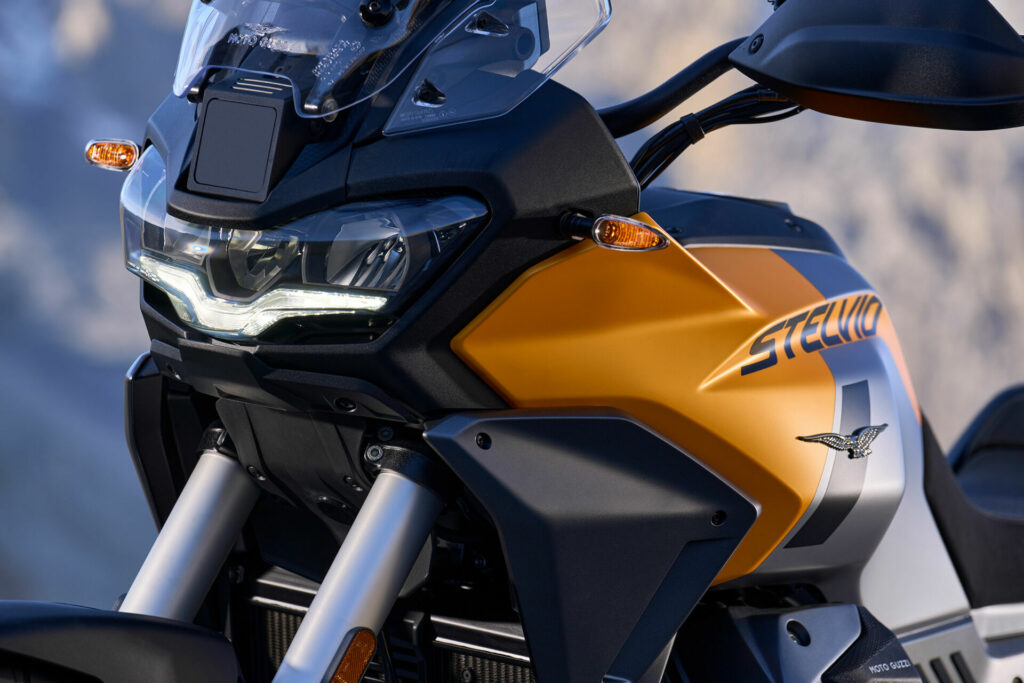
These devices play a key role on the active safety front, providing the Following Cruise Control (FCC), Forward Collision Warning (FCW), Blind Spot Information System (BLIS) and Lane Change Assist (LCA) functions. FCC represents an advanced cruise control system that utilizes the front radar to adapt the speed based on the vehicle in front. This system intervenes in engine brake control, amplifying it if the vehicle in front decelerates. The system acts on engine brake control, increasing it if the vehicle in front slows down.
The FCW uses the front radar to identify potential collisions with vehicles and objects situated in front of the motorcycle. BLIS serves to notify the rider of vehicles located in the blind spots detected by the rearview mirrors. Additionally, the LCA function continuously scans the area up to 30 meters behind, also identifying vehicles approaching from the side that could pose a lane-changing hazard. In all instances, the driver is alerted through appropriate audible and visual warnings displayed on the instrumentation and rearview mirrors.
The system is part of a first-rate electronics package, which includes Ride-by-wire electronic throttle for fine performance and fuel economy management, the advanced Marelli 11MP control unit and the 6-axis inertial platform. The latter, equipped with accelerometers and gyroscopes, possesses the capability to discern the bike’s orientation in relation to the road. It records and analyses inputs from the ride and transmits this data to the control unit, which then takes action to optimize control parameters as necessary. The six-axis platform allows the full potential of Cornering ABS, developed in collaboration with Continental, to be exploited to ensure maximum safety on the road. This system can enhance braking and ABS intervention while cornering, facilitated by a dedicated algorithm that continually monitors various parameters including lateral acceleration, front brake lever pressure, lean angle, pitching, and yawing. It dynamically adjusts the brake action to ensure an optimal balance between deceleration and stability.
There are five distinct Riding Modes available: Tourism, Rain, Street, Sport, and Off-Road. Each mode offers three different engine maps, four levels of traction control, three levels of engine brake and two levels of ABS control. Moto Guzzi’s technology is designed not only to enhance safety and enjoyment in riding but also to simplify life on the road. The rider simply needs to choose the Riding Mode that best aligns with their riding preferences to automatically achieve the optimal adjustment of the electronic parameters in use. These settings can also be personalized, allowing riders to fine-tune the parameters to match their individual preferences.
Tourism: This Riding Mode is tailored for long-distance travel. In this mode, the Engine Brake Intervention (MGFM) is set to a moderate level, aiding deceleration when the throttle is closed. The Power Delivery (MGCM) is progressive, at level 2 out of 3, and the Traction Control (MGCT) is set at level three out of four for added stability.
Rain: This mode is optimized for challenging weather conditions. Engine braking is set at a moderate level and power delivery is very gentle (level 3 out of 3). Traction control is at its highest level for maximum safety during acceleration.
Road: In this mode, the electronic settings are geared towards typical road driving. Engine braking is at a medium level, power delivery (MGCM) is progressive (level 2 out of 3), and traction control (MGCT) is configured at the second level out of four.
Sport: Electronic adjustments are precisely tuned to deliver an exhilarating sporty riding experience. Engine braking is minimal, power delivery (MGCM) is more direct and sportier (level 1 out of 3), and traction control (MGCT) is the least obtrusive (level one out of four). The ABS calibration enables very firm braking.
Off-Road: This mode is designed explicitly for off-road adventures. Engine braking is pronounced, and power delivery is at its most direct. Traction control and ABS are finely tuned for off-road use. Traction control has minimal intervention, while ABS is active only on the front wheel. This configuration enables off-road enthusiasts to enjoy their adventures without the risk of losing control of the motorcycle. Moreover, it is possible to deactivate both traction control (across all riding modes) and ABS on both wheels (in Off-Road mode only) for added flexibility and control.
The standard equipment includes a full LED lighting system with Daytime Running Lights (DRLs), the ‘bending lights’ system (which adds extra headlamps in the windshields to illuminate the inside of corners, improving visibility when leaning), and a USB port located beside the instrumentation. The latter is a 5-inch color TFT panel offering a range of information, such as fuel level, air and coolant temperature, gear engaged indicator, remaining range, and instantaneous consumption.
Additional accessories include Moto Guzzi MIA, the multimedia platform enabling smartphone connectivity with the instrumentation through Bluetooth. Moto Guzzi MIA combines an infotainment system for managing voice assistant, phone calls, and music using intuitive handlebar controls, as well as a navigation feature. With this feature, after setting the destination on your smartphone, you can display directions directly on the instrumentation.
Versions and Colors
Moto Guzzi Stelvio is available with or without PFF Rider Assistance Solution.
There are two color variants, both matte: Giallo Savana, which features a dark yellow hue on the front of the tank and on the side panels and the more elegant Nero Vulcano, dominated by the black/grey combination, with some yellow highlights on the tank and side panels.
A Wide Range of Accessories for All Needs
The range of accessories dedicated to the Moto Guzzi Stelvio includes beautifully crafted details designed to make the riding experience even more comfortable and engaging.
Hard side cases: designed to attach to the bike without requiring any additional supports and featuring a painted cover. The left-side case offers a capacity of 30 liters, while the right-side case provides 29 liters of storage. Both are spacious enough to accommodate a full-face helmet and can be conveniently opened using the motorcycle’s ignition key.
Top case: equipped with covers to match the cases, it has a capacity of 37 liters and has a backrest made of the same fabric as the seat. It also opens using the motorcycle’s ignition key.
Top case XL: dedicated to long-haul travel, it has a 52-litre capacity that can accommodate two full-face helmets. It has a matching cover and a backrest made of the same fabric as the seat. It opens with the same start key as the motorcycle.
Aerodynamic windshield: is made of polycarbonate and provides excellent protection on trips.
Heated comfort seat: an indispensable aid for dealing with colder climates. It is adjustable through handlebar controls to three different temperature levels. Equipped with a 3D Net insert that makes it very comfortable. Also available in higher and lower versions.
Heated comfort passenger seat: features a 3D Net padding that can provide more comfort when traveling. Adjustable to three temperature levels.
Heated grips: essential for tackling winter, they do not require additional electrical controls and are adjustable to three temperature levels.
Engine guards: durable protective tubulars powder-coated in the same color as the frame. They safeguard the engine in case of a fall.
Head guards: made of billet aluminum, they protect the heads from accidental impacts.
Centre stand: solid support in parking, also useful for bike maintenance.
Auxiliary light kit: additional LED spotlights that can increase the light beam.
USB port: an additional USB port installed beneath the seat, complementing the one that comes standard with the bike.
TPMS: indicates tire pressure on the instrumentation.
Moto Guzzi MIA: the multimedia platform that allows the smartphone to be connected to the instrumentation via Bluetooth, extending its functions.
Quickshifter: the bidirectional electronic gearbox that allows very fast shifts without using the clutch control.
Electronic anti-theft device: installs on the original electrical system without modification. Equipped with remote control.
Indoor motorcycle cover: elegant stretch sheet, tailored to the shapes of Stelvio.
Moto Guzzi Adventure Apparel
This is the clothing line dedicated to motorcyclists, designed to be versatile, easy to wear and protective in all conditions.
Road Carver jacket: a removable two-layer technical jacket with a Moto Guzzi Watershield waterproof membrane and removable winter lining and certified protectors on elbows and shoulders. There is a reflective design on the back that echoes that of the DRL on the Stelvio’s headlight cluster.
Road Carver Pants: technical pants equipped with Moto Guzzi Watershield waterproof membrane and removable, adjustable waist. Equipped with pockets and air vents.
Trail Chaser Gloves: provide protection from the elements, thanks to the Moto Guzzi Watershield waterproof membrane. They feature knuckle and palm protectors; touchscreen inserts on fingers and easy-to-adjust Velcro closure band.
Moto Guzzi Stelvio: Data Sheet
ENGINE
| Type | Liquid-cooled 90° transverse V-twin cylinder. Double overhead camshaft distribution with finger rocker arms and four valves per cylinder |
| Displacement | 1042 cc |
| Bore and stroke | 96 x 72 mm |
| Compression ratio | 12.6:1 |
| Maximum power | 115 CV (84,6 kW) at 8,700 rpm |
| Torque | 105 Nm (10,7 kgm) at 6,750 rpm |
| Fuel | Electronic fuel injection; dual Ø 52 mm throttle bodies and Ride by wire management
|
| Fuel tank capacity | 21 liters (reserve 3.5 liters) |
| Homologation | Euro 5+ |
| Fuel consumption (WMTC cycle) | 5.1 l/100 km |
| CO2 emissions (WMTC cycle) | 119 g/km |
TRANSMISSION
| Clutch | Wet multi-disc clutch with slipper clutch and hydraulic control and integrated clutch slave
|
| Gears | 6-speed gearbox |
| Primary transmission | Straight-geared, gear ratio: 31/48 (1.548) |
| Primary transmission | Cardan shaft drive: gear ratio: 12/38 (3.166) |
| Control management | 3 engine maps (MGCM), 3 levels of engine brake control (MGFM), 4 levels of traction control (MGTC), cruise control. 5 Riding modes (Touring, Rain, Road, Sport, Off-Road)
|
FRAME AND WHEEL CHARACTERISTICS
| Frame | Tubular high-strength steel frame
|
| Front suspension | Front suspension Sachs telescopic hydraulic upside-down fork, Ø 46 mm, adjustable spring preload and rebound hydraulics
|
| Front wheel travel | 170 mm |
| Rear suspension | Aluminum single-sided shock absorber left side, adjustable in spring preload with knob and rebound hydraulics |
| Rear wheel travel | 170 mm |
| Brakes | Front: dual stainless steel floating discs, Ø 320 mm, Brembo radial-mount calipers with 4 opposed pistons and metal braided hose
Rear: stainless steel disc, Ø 280 mm, Brembo floating 2-piston caliper. Continental ABS with cornering function
|
| Wheels | Aluminum alloy |
| Front rim | Tubeless spoked 3.0″ x 19″ |
| Rear rim | Tubeless spoked 4.5″ x 17″ |
| Front tire | Radial tubeless 120/70 – R19″ |
| Rear tire | Radial tubeless 170/60 – R17″ |
ELECTRICAL SYSTEM
| A/C generator | 550 W |
| System voltage | 12 V |
| Battery | 12 V – 12 Ah |
DIMENSIONS
| Length | 2.195 mm |
| Width | 945 mm |
| Wheelbase | 1520 mm |
| Seat height | 830 mm |
| Steering headstock tilt | 25,6° |
| Trail | 116,4 mm |
| Dry weight | 222 kg |
| Weight in running order *
|
246 kg
* Weight with bike ready to ride, with all operating fluids and 90% fuel
|


